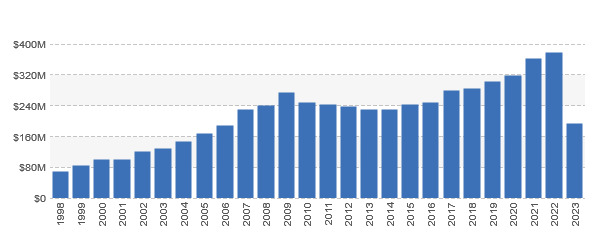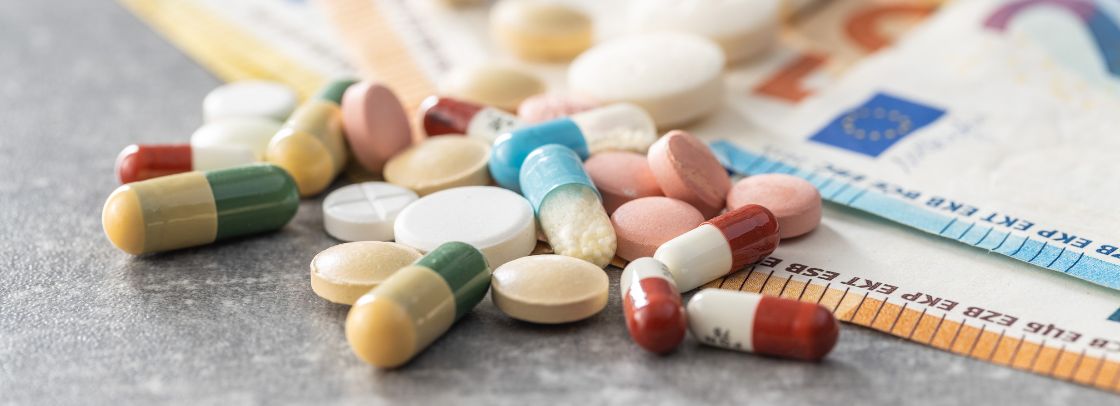Big Pharma spends more than any other industry to lobby the US Congress and federal agencies but still suffered a major defeat after failing to stop a bill that allows the government to negotiate prices on select drugs. The political pressure from below and the pressure on public budgets have brought the unthinkable: the pharmaceutical companies are about to lose influence and money.
In September 2023, a federal judge ruled that the US government's Medicare health insurance program can begin negotiating prices for some prescription drugs under a new program, vindicating one of President Joe Biden's signature initiatives.
According to a Reuters report, the order by US District Judge Michael Newman in Dayton, Ohio, came in a lawsuit brought against the Biden administration by the US Chamber of Commerce. The largest business lobbying group argues that the program violates the US Constitution by allowing the government to force drugmakers to accept unfairly low prices and stifle innovation.
In a preliminary order, Newman rejected that argument, finding that drugmakers were unlikely to prevail in the case. He said they were not being forced to give anything up because participating in Medicare is "completely voluntary." "As there is no constitutional right (or requirement) to engage in business with the government, the consequences of that participation cannot be considered a constitutional violation," he wrote.
This ruling allowed the price negotiation program to begin on October 1. Still, the judge allowed the lawsuit to continue, denying a motion by the government to dismiss it altogether.
The ruling is the first from multiple lawsuits by drug companies and industry groups challenging the program. Newman was appointed to the bench by Republican former President Donald Trump. The drug price negotiation program is part of the Inflation Reduction Act, which Biden, a Democrat, signed last year.
Health policy experts quoted by Reuters say the bill reflects the pharma industry's weakening influence on the Democratic Party and that its central argument against price negotiation -- that it stifles innovation -- is no longer persuasive for the public.
Americans pay more for prescription medicines than people in any other country. The program aims to save $25 billion annually by 2031 by requiring drugmakers to negotiate the prices of selected expensive drugs with the US Centers for Medicare and Medicaid Service (CMS), which oversees Medicare.
Drugmakers whose medicines were selected for the first round of pricing negotiations had to agree to begin talks on October 1. Those who do not negotiate either would have to pay steep penalties, up to 19 times a drug's sales, or stop participating in the government healthcare programs, which account for a significant portion of the companies' US sales.
CMS announced the first ten drugs to be negotiated on August 29. They include the blood thinners Eliquis from Bristol Myers Squibb and Pfizer, Xarelto from Johnson & Johnson, Merck & Co's diabetes drug Januvia, and AbbVie's leukemia treatment Imbruvica. The negotiated prices would take effect in 2026 with a minimum discount from the list price of 25%.
The Chamber of Commerce's lawsuit is one of several similar cases challenging the program. The others were filed by individual drugmakers and Pharmaceutical Research and Manufacturers of America, the leading drug industry lobbying group. Companies that have sued over the program include J&J, Merck, Bristol Myers, and Boehringer Ingelheim, which make drugs on CMS's negotiation list.
The Chamber of Commerce was the only plaintiff to ask for a preliminary injunction halting the price negotiations while its lawsuit proceeds. The other lawsuits are moving slower, and judges may not rule on them until next year.
The new power to negotiate prices on the most expensive prescription drugs under Medicare was adopted as part of the Inflation Reduction Act (IRA) of 2022. It is designed to reduce government healthcare spending and has shocked the pharmaceutical industry, as the change is unprecedented. Unlike in Europe, where governments have long imposed price controls on healthcare products, until now, pharmaceutical companies in the US have had absolute discretion in pricing.
That's why the Big Pharma lobbying power has been mobilized at unprecedented levels. Pharmaceutical companies are well aware of the threat of lower profits. After failing to defeat the measure in Congress, they have been working ever since to manipulate the terms of its application with public decision-makers, arguing that lower prices and reduced profits would jeopardize funding for research and development of new drugs.
An analysis by OpenSecrets found that the IRA was the top bill targeted in federal lobbying efforts across all industries last year, with 1,647 organizations reporting lobbying it. While the top lobbyists were from the health sector, tech, automotive, communications, and energy companies were also lobbying on the bill.
According to OpenSectrets, Medicare had previously been blocked from negotiating drug costs due to a 2003 "non-interference" law signed into law by then-President George W. Bush called the Medicare Prescription Drug, Improvement, and Modernization Act, as opposed to many European nations in which the government negotiates a drug's prices based on its efficacy and drugs cost on average 40 percent less than what they do in the United States. Americans spend more money on prescription drugs than those in any other developed nation in the world.
Pharmaceutical companies have long argued that restricting drug prices would halt innovation and that they need profits to finance development. Now that the legislation has passed, drugmakers say they cannot figure out how to strategize and which drugs to invest since they do not know how much money they will make.
Pharmaceutical and health product companies poured over $377 million into lobbying Congress and federal agencies in 2022, outspending every other industry and making up over half of all health sector lobbying efforts. Most of Big Pharma's 2022 lobbying efforts aimed at the Inflation Reduction Act. The Pharmaceutical Research & Manufacturers of America was the top individual lobbying spender in the industry in 2022, spending $29.2 million for its lobbyists to cozy up to legislators.
Each year for the past decade, the pharmaceutical and health product industry has upped its federal lobbying expenditures from the previous year, an overall increase of 36% since 2013. The latest figures show that $192 million has been spent by October 2023, which might signal that the industry has stepped on the brakes, as the IRA was signed into law in 2022.

Credit: OpenSecrets
There are currently 1,679 registered lobbyists working for pharmaceutical and health products, meaning the industry has more than three lobbyists for each member of Congress. Over half of these lobbyists are so-called "revolving door" hires who previously served in government positions before joining the private sector, both for Democratic and Republican administrations.
The consensus among the American tax-payers about the need to change things is apparent in an op-ed signed by left-leaning senator Bernie Sanders and hosted by right-leaning Fox News: "With one out of four Americans unable to afford the prescriptions their doctors prescribe, many of our people become sicker than they should and far too many have died unnecessarily. At a time when 10 of the top pharmaceutical companies made over $112 billion in profits last year, why do we continue paying the highest prices in the world for prescription drugs?".









